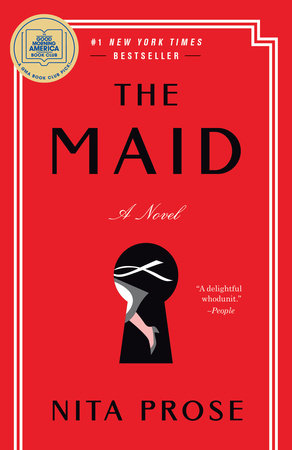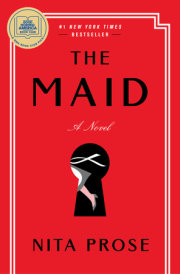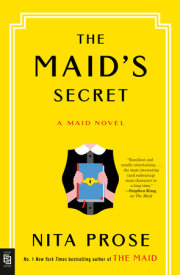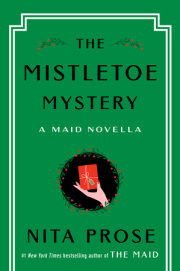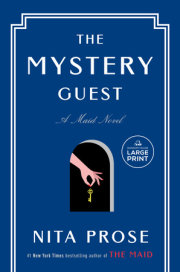Chapter 1
I am well aware that my name is ridiculous. It was not ridiculous before I took this job four years ago. I’m a maid at the Regency Grand Hotel, and my name is Molly. Molly Maid. A joke. Before I took the job, Molly was just a name, given to me by my estranged mother, who left me so long ago that I have no memory of her, just a few photos and the stories Gran has told me. Gran said my mother thought Molly was a cute name for a girl, that it conjured apple cheeks and pigtails, neither of which I have, as it turns out. I’ve got simple, dark hair that I maintain in a sharp, neat bob. I part my hair in the middle—the exact middle. I comb it flat and straight. I like things simple and neat.
I have pointed cheekbones and pale skin that people sometimes marvel at, and I don’t know why. I’m as white as the sheets that I take off and put on, take off and put on, all day long in the twenty-plus rooms that I make up for the esteemed guests at the Regency Grand, a five-star boutique hotel that prides itself on “sophisticated elegance and proper decorum for the modern age.”
Never in my life did I think I’d hold such a lofty position in a grand hotel. I know others think differently, that a maid is a lowly nobody. I know we’re all supposed to aspire to become doctors and lawyers and rich real-estate tycoons. But not me. I’m so thankful for my job that I pinch myself every day. I really do. Especially now, without Gran. Without her, home isn’t home. It’s as though all the color has been drained from the apartment we shared. But the moment I enter the Regency Grand, the world turns Technicolor bright.
As I place a hand on the shining brass railing and walk up the scarlet steps that lead to the hotel’s majestic portico, I’m Dorothy entering Oz. I push through the gleaming revolving doors and I see my true self reflected in the glass—my dark hair and pale complexion are omnipresent, but a blush returns to my cheeks, my raison d’être restored once more.
Once I’m through the doors, I often pause to take in the grandeur of the lobby. It never tarnishes. It never grows drab or dusty. It never dulls or fades. It is blessedly the same each and every day. There’s the reception and concierge to the left, with its midnight-obsidian counter and smart-looking receptionists in black and white, like penguins. And there’s the ample lobby itself, laid out in a horseshoe, with its fine Italian marble floors that radiate pristine white, drawing the eye up, up to the second-floor terrace. There are the ornate Art Deco features of the terrace and the grand staircase that brings you there, balustrades glowing and opulent, serpents twisting up to golden knobs held static in brass jaws. Guests will often stand at the rails, hands resting on a glowing post, as they survey the glorious scene below—porters marching crisscross, dragging suitcases behind them, guests lounging in sumptuous armchairs or couples tucked into emerald loveseats, their secrets absorbed into the deep, plush velvet.
But perhaps my favorite part of the lobby is the olfactory sensation, that first redolent breath as I take in the scent of the hotel itself at the start of every shift—the mélange of ladies’ fine perfumes, the dark musk of the leather armchairs, the tangy zing of lemon polish that’s used twice daily on the gleaming marble floors. It is the very scent of animus. It is the fragrance of life itself.
Every day, when I arrive to work at the Regency Grand, I feel alive again, part of the fabric of things, the splendor and the color. I am part of the design, a bright, unique square, integral to the tapestry.
Gran used to say, “If you love your job, you’ll never work a day in your life.” And she’s right. Every day of work is a joy to me. I was born to do this job. I love cleaning, I love my maid’s trolley, and I love my uniform.
There’s nothing quite like a perfectly stocked maid’s trolley early in the morning. It is, in my humble opinion, a cornucopia of bounty and beauty. The crisp little packages of delicately wrapped soaps that smell of orange blossom, the tiny Crabtree & Evelyn shampoo bottles, the squat tissue boxes, the toilet-paper rolls wrapped in hygienic film, the bleached white towels in three sizes—bath, hand, and washcloth—and the stacks of doilies for the tea-and-coffee service tray. And last but not least, the cleaning kit, which includes a feather duster, lemon furniture polish, lightly scented antiseptic garbage bags, as well as an impressive array of spray bottles of solvents and disinfectants, all lined up and ready to combat any stain, be it coffee rings, vomit—or even blood. A well-stocked housekeeping trolley is a portable sanitation miracle; it is a clean machine on wheels. And as I said, it is beautiful.
And my uniform. If I had to choose between my uniform and my trolley, I don’t think I could. My uniform is my freedom. It is the ultimate invisibility cloak. At the Regency Grand, it’s dry cleaned daily in the hotel laundry, which is located in the dank bowels of the hotel down the hall from our housekeeping change rooms. Every day before I arrive at work, my uniform is hooked on my locker door. It comes wrapped in clingy plastic, with a little Post-it note that has my name scrawled on it in black marker. What a joy it is to see it there in the morning, my second skin—clean, disinfected, newly pressed, smelling like a mixture of fresh paper, an indoor pool, and nothingness. A new beginning. It’s as though the day before and the many days before that have all been erased.
When I don my maid uniform—not the frumpy Downton Abbey style or even the Playboy-bunny cliché, but the blinding-white starched dress shirt and the slim-fit black pencil skirt (made from stretchy fabric for easy bending)—I am whole. Once I’m dressed for my workday, I feel more confident, like I know just what to say and do—at least, most of the time. And once I take off my uniform at the end of the day, I feel naked, unprotected, undone.
The truth is, I often have trouble with social situations; it’s as though everyone is playing an elaborate game with complex rules they all know, but I’m always playing for the first time. I make etiquette mistakes with alarming regularity, offend when I mean to compliment, misread body language, say the wrong thing at the wrong time. It’s only because of my gran that I know a smile doesn’t necessarily mean someone is happy. Sometimes, people smile when they’re laughing at you. Or they’ll thank you when they really want to slap you across the face. Gran used to say my reading of behaviors was improving—every day in every way, my dear—but now, without her, I struggle. Before, when I rushed home after work, I’d throw open the door to our apartment and ask her questions I’d saved up over the day. “I’m home! Gran, does ketchup really work on brass, or should I stick to salt and vinegar? Is it true that some people drink tea with cream? Gran, why did they call me Rumba at work today?”
But now, when the door to home opens, there’s no “Oh, Molly dear, I can explain” or “Let me make you a proper cuppa and I’ll answer all of that.” Now our cozy two-bedroom feels hollow and lifeless and empty, like a cave. Or a coffin. Or a grave.
I think it’s because I have difficulty interpreting expressions that I’m the last person anyone invites to a party, even though I really like parties. Apparently, I make awkward conversation, and if you believe the whispers, I have no friends my age. To be fair, this is one hundred percent accurate. I have no friends my age, few friends of any age, for that matter.
But at work, when I’m wearing my uniform, I blend in. I become part of the hotel’s décor, like the black-and-white-striped wallpaper that adorns many a hallway and room. In my uniform, as long as I keep my mouth shut, I can be anyone. You could see me in a police lineup and fail to pick me out even though you walked by me ten times in one day.
Recently, I turned twenty-five, “a quarter of a century” my gran would proclaim to me now if she could say anything to me. Which she can’t, because she is dead.
Copyright © 2022 by Nita Prose. All rights reserved. No part of this excerpt may be reproduced or reprinted without permission in writing from the publisher.





